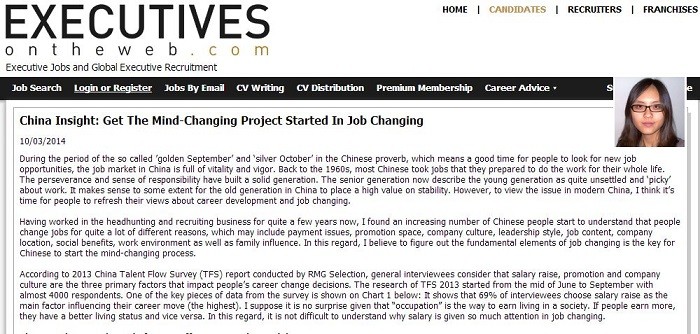
 An interesting point I noticed in this report is about the job changing situation with women: Decades ago, Chinese women were not allowed or not appreciated to work outside. The fast development in the society allows Chinese women to touch the outside environment. It can be seen in Chart 2 and Chart 3 the top 3 factors affecting job changing decisions are exactly the same in male and female. Furthermore, the data are basically at the same level. From taking the role of housewives to getting prepared to be female elites, Chinese women seems adjust themselves very well in career development.
Chart 2 Job changing factors in male
An interesting point I noticed in this report is about the job changing situation with women: Decades ago, Chinese women were not allowed or not appreciated to work outside. The fast development in the society allows Chinese women to touch the outside environment. It can be seen in Chart 2 and Chart 3 the top 3 factors affecting job changing decisions are exactly the same in male and female. Furthermore, the data are basically at the same level. From taking the role of housewives to getting prepared to be female elites, Chinese women seems adjust themselves very well in career development.
Chart 2 Job changing factors in male
 Chart 3 Job changing factors in female
Chart 3 Job changing factors in female
 During the past years of my staying in this culturally diverse country, I have heard quite a lot of interesting stories and history about China and Chinese culture. A very important example of this can be seen in chart 4 – “Promotion”, which is closely related with the deep rooted Chinese cultural importance placed on promotion and advancement. According to the famous Chinese ancient encyclopedia Lu Shi Chun Qiu, every single employee wants to get promoted in the hierarchical system. It is regarded as a fundamental need for people’s self-actualization. Back to the modern society, getting promotion is regarded as the recognition of employees’ hard-working and achievements.
Chart 4 Influence of promotion in job changing by age groups
During the past years of my staying in this culturally diverse country, I have heard quite a lot of interesting stories and history about China and Chinese culture. A very important example of this can be seen in chart 4 – “Promotion”, which is closely related with the deep rooted Chinese cultural importance placed on promotion and advancement. According to the famous Chinese ancient encyclopedia Lu Shi Chun Qiu, every single employee wants to get promoted in the hierarchical system. It is regarded as a fundamental need for people’s self-actualization. Back to the modern society, getting promotion is regarded as the recognition of employees’ hard-working and achievements.
Chart 4 Influence of promotion in job changing by age groups
 Though promotion ranks the second reason for people who are looking for new job opportunities, the need to be promoted varies in different age groups. Taking a look at the line graph (Chart 4) about promotion in different age groups, the influence of promotion is increasing from age of 18 to 35. People who are 30 to 35 years old are at the stage of golden career. Once they are at the position that they are satisfied, the need and want of changing jobs to simply get promotion becomes less strong. Comparatively, people at the younger age group might move on with their career because of a good promotion space in the new company.
The third element on the Chart 1 is really of great importance. Half of interviewees ‘hop’ to other companies simply because they like the company culture. Things like company values, working environment, collegial relationships, and core leaders matter to a large extent. The reason why it (company culture etc) matters is that in fact attracting talent is only the first step, and in fact perhaps the more important question is how to retain talent in a company. According to my experience in recruitment, more than 90% of the typical leaving reasons are actually related to his or her line manager or the management style of the company. However, lots of companies have never paid any attention on company culture building. Company culture equals the ‘smart power’ of the company. The influence of this ‘smart power’ is well penetrated in the operation process, which can be brought to not only clients as well as job seekers but employees as well.
Having contributed to many job interviews, I have quite a few interviewees telling me that they leave their current company simply because of the terrible working atmosphere, poor colleague relationship and punishing system which all belong to part of the company culture building. Money is an important element when people considering changing jobs, but I suppose nowadays people start to care about more than that. To create a unique corporate culture is extremely important for the competing enterprise. As an essential part of corporate culture, the branding of the employer not only enhances the sale-value, also able to attract talent for the enterprise
The last one on the list of Chart 1 is opinions from families. To be honest, I dare not agree with the argument that families don’t play a part in the job change decision making process. In the traditional Chinese culture, actually family is a very influential factor when people consider something very important. To show you this clearly, I would like to illustrate family opinion with a case of headhunters. Headhunters sometimes need to deal with cases of relocation. At this moment, opinions from family members can represent the decision-making power. Relocation might involve the moving of the whole family, which indeed need agreement from every family member.
Though promotion ranks the second reason for people who are looking for new job opportunities, the need to be promoted varies in different age groups. Taking a look at the line graph (Chart 4) about promotion in different age groups, the influence of promotion is increasing from age of 18 to 35. People who are 30 to 35 years old are at the stage of golden career. Once they are at the position that they are satisfied, the need and want of changing jobs to simply get promotion becomes less strong. Comparatively, people at the younger age group might move on with their career because of a good promotion space in the new company.
The third element on the Chart 1 is really of great importance. Half of interviewees ‘hop’ to other companies simply because they like the company culture. Things like company values, working environment, collegial relationships, and core leaders matter to a large extent. The reason why it (company culture etc) matters is that in fact attracting talent is only the first step, and in fact perhaps the more important question is how to retain talent in a company. According to my experience in recruitment, more than 90% of the typical leaving reasons are actually related to his or her line manager or the management style of the company. However, lots of companies have never paid any attention on company culture building. Company culture equals the ‘smart power’ of the company. The influence of this ‘smart power’ is well penetrated in the operation process, which can be brought to not only clients as well as job seekers but employees as well.
Having contributed to many job interviews, I have quite a few interviewees telling me that they leave their current company simply because of the terrible working atmosphere, poor colleague relationship and punishing system which all belong to part of the company culture building. Money is an important element when people considering changing jobs, but I suppose nowadays people start to care about more than that. To create a unique corporate culture is extremely important for the competing enterprise. As an essential part of corporate culture, the branding of the employer not only enhances the sale-value, also able to attract talent for the enterprise
The last one on the list of Chart 1 is opinions from families. To be honest, I dare not agree with the argument that families don’t play a part in the job change decision making process. In the traditional Chinese culture, actually family is a very influential factor when people consider something very important. To show you this clearly, I would like to illustrate family opinion with a case of headhunters. Headhunters sometimes need to deal with cases of relocation. At this moment, opinions from family members can represent the decision-making power. Relocation might involve the moving of the whole family, which indeed need agreement from every family member.



